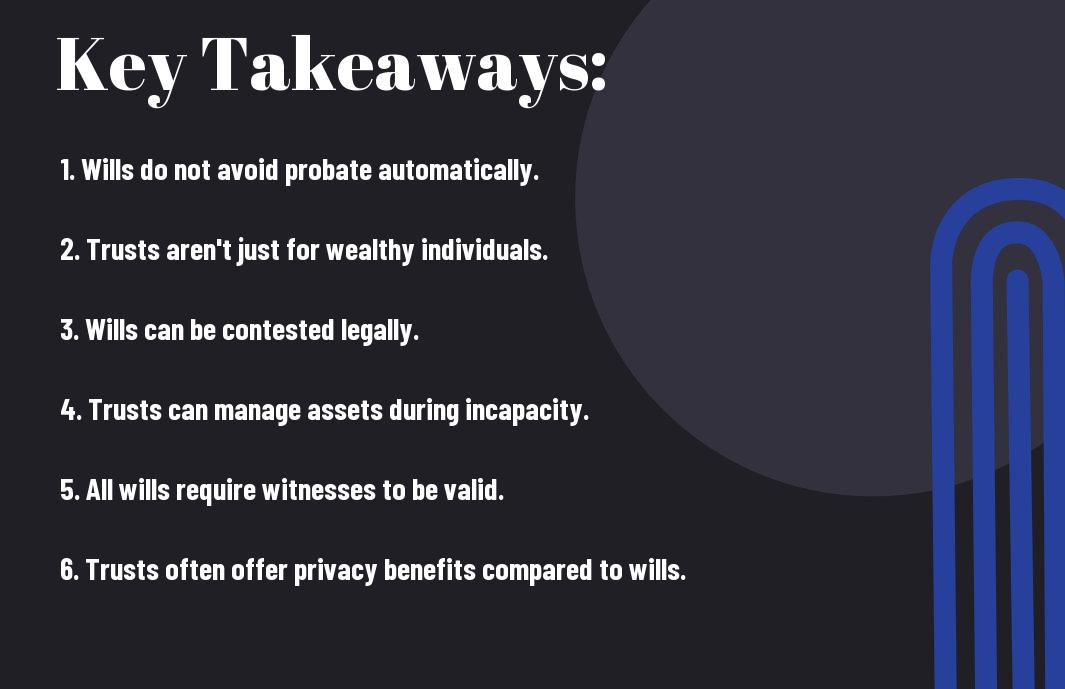
PARENTS & HOMEOWNERS: MY 7-STEP ESTATE PLANNING PROCESS WILL PROTECT YOUR HEIRS
From Creditors, Predators & Bad Choices, And Will Help You Become a (Bigger) Hero to Your Family!


10 Common Misconceptions About Wills And Trusts
With the right information, you can make informed decisions about your estate planning. Many people hold misconceptions about wills and trusts that can lead to costly mistakes or ineffective planning. In this blog post, we will uncover ten common misunderstandings that could affect your ability to protect your assets and provide for your loved ones. Understanding these myths will empower you to take charge of your estate planning and ensure your wishes are respected.
Key Takeaways:
- Wills vs. Trusts: A will is not the same as a trust; they serve different purposes in estate planning.
- Requirement of Lawyers: You don’t always need a lawyer to create a will or trust, although professional guidance can be helpful if not critical.
- Minors and Trusts: Trusts can be beneficial for minor children, providing a way to manage their inheritance until they reach adulthood.
- Tax Implications: Wills and trusts do not automatically shield assets from taxes; proper planning is imperative.
- Revocability: Not all trusts are irrevocable; many can be altered or terminated under certain conditions.

Misconception 1: Wills and Trusts Are the Same
A significant misunderstanding you might encounter is the belief that wills and trusts are interchangeable. While both are important components of estate planning, they serve distinct purposes. A will is a legal document that outlines your wishes regarding the distribution of your assets after your death, appoints guardians for minor children, and names an executor to carry out your directives. In contrast, a trust is a fiduciary arrangement that allows a third party, known as a trustee, to hold assets on behalf of beneficiaries during your lifetime and even after your death, often bypassing the lengthy and costly probate process.
Understanding that wills and trusts have different functions can significantly impact your estate planning strategy. With a will, you retain control of your assets until your passing, while a trust allows for more immediate management and distribution under specified terms. Moreover, trusts can provide privacy and protection from lawsuits, something that a will cannot offer, as wills become public record once they go through probate. Recognizing these differences enables you to make well-informed decisions about how to best structure your estate to achieve your goals.
Misconception 2: Only the Wealthy Need Wills and Trusts
Any individual, regardless of their financial status, can benefit from having a will or trust. This misconception can lead to the belief that estate planning is only necessary for the affluent, but in reality, everyone has something of value to protect — whether it’s your home, personal belongings, or even your digital assets. If you pass away without a will or trust, your loved ones may face unexpected challenges, such as lengthy probate processes or disputes over your wishes. By taking the time to create these documents, you not only safeguard your assets but also provide clarity and peace for your family during a difficult time.
Additionally, a will or trust allows you to make important decisions regarding guardianship of your children or dependents. This means you have the power to ensure that your loved ones are taken care of according to your wishes. Having a plan in place can give you peace of mind, knowing that your intentions will be honored and that your assets will be distributed according to your preferences. In short, estate planning is not solely for those with significant wealth; it is an crucial part of responsible financial management that benefits everyone.

Misconception 3: Wills Are Only for After Death
Now, you might think that wills solely serve the purpose of distributing your assets after you pass away. However, this perspective overlooks the full scope of what a will can accomplish during your lifetime. A will can not only outline your wishes for after your death but can also include provisions for care in case you become incapacitated. This means that you can use your will to establish guardians for your children or detail medical treatment preferences, ensuring that your wishes are respected even when you aren’t able to communicate them yourself.
Additionally, having a will in place can provide peace of mind throughout your life. Knowing that your affairs are organized and your loved ones are taken care of can significantly alleviate stress. If you believe that your will is only a tool for posthumous distribution, you may unintentionally neglect to make important decisions that protect you and your family’s future while you are still alive. A comprehensive approach to estate planning includes both your lifetime preferences and after-death directives, ensuring that you take control of your journey every step of the way.
Misconception 4: Trusts Are Too Complicated to Set Up
There’s a prevalent belief that setting up a trust is an overwhelming process filled with legal jargon and complexities that only lawyers can navigate. In reality, establishing a trust can be quite straightforward when approached with the right information and guidance. While it is true that there are various types of trusts, each serving different purposes, many individuals find that a simple revocable living trust is not as difficult to set up as they initially feared. With the help of a knowledgeable estate planning professional, you can create a trust that aligns with your needs and objectives.
Additionally, the tools and resources available today make the process even less daunting. Many estate planning services provide user-friendly templates and software programs designed to assist you in creating a trust. Although you might appreciate a hands-on approach, collaborating with a professional ensures that your trust meets all legal requirements and functions as intended. Ultimately, by shedding the misconception that trusts are overly complicated, you open yourself up to the profound benefits that a well-structured trust can offer in terms of asset protection and resource management.
Misconception 5: You Can’t Change a Will Once It’s Made
You may believe that once a will is drafted and signed, it becomes set in stone. However, this is a common misconception; in reality, you have the power to modify your will whenever necessary. Life circumstances, such as marriage, divorce, the birth of children, or changes in financial status, may prompt you to update your will to reflect your current wishes. As the testator, you retain full authority to make changes as needed.
To amend a will, you can either create a new will entirely or add a codicil, which is an official document that outlines the specific amendments you wish to make. This ability to change your will ensures that your estate reflects your most recent desires, giving you peace of mind knowing that your assets will be distributed according to your current intentions. Never hesitate to revise your will; staying proactive can prevent misunderstandings and conflicts among your heirs in the future.
Misconception 6: All Trusts Avoid Probate
After stepping into estate planning, you may come across the belief that all trusts can completely sidestep the probate process. This is a dangerous assumption that could lead you to overlook significant details about how trusts function. While it’s true that many types of trusts, such as revocable living trusts, are designed to help your assets avoid probate, not every trust achieves this goal. For example, certain irrevocable trusts may still be subject to probate depending on how they are structured or if the assets are not properly funded into the trust before your passing.
It’s vital to understand that the key factor in avoiding probate rests in properly transferring your assets into the trust. If you neglect to do so, or if the trust is not correctly established, your assets may still go through probate, leading to delays and additional costs. Therefore, when considering a trust as part of your estate plan, be proactive. Consulting a qualified estate planning attorney can ensure that you set up your trust correctly and that your assets are efficiently managed to achieve your goal of avoiding probate.
Conclusion
With this in mind, it is imperative for you to have a clear understanding of the common misconceptions surrounding wills and trusts. These misconceptions can lead you to make uninformed decisions about your estate planning, potentially compromising your wishes for the future. By debunking myths such as the belief that wills avoid probate, or that only wealthy individuals require trusts, you empower yourself to make educated choices that suit your personal circumstances. Engaging with professionals in estate planning can further enhance your knowledge and ensure that your estate is managed according to your desires.
<pUltimately, educating yourself about wills and trusts can help you navigate the complexities of estate planning more effectively. As you gain clarity on these topics, you can better prepare for your legacy and ensure that your loved ones are cared for according to your preferences. Taking the time to evaluate your options and make informed decisions today will not only provide peace of mind but also protect your assets and safeguard your family’s future.
FAQ
Q: What is the main difference between a will and a trust?
A: The primary distinction between a will and a trust lies in their function and timing. A will is a legal document that outlines how you want your assets distributed after your death. It is subject to probate, which is the legal process of validating the will. In contrast, a trust is a fiduciary arrangement that allows a third party, known as a trustee, to hold assets on behalf of beneficiaries. Trusts can take effect during your lifetime and often avoid probate, making the transfer of assets generally faster and more private.
Q: Can I create a will or trust without a lawyer?
A: While it is possible to create a will or a trust without legal assistance using templates or online tools, it is advisable to consult an attorney. Legal professionals can ensure that the documents comply with state laws, are correctly executed, and reflect your wishes accurately. This reduces the risk of future disputes or misunderstandings regarding your intentions.
Q: Do I need a will if I have a trust?
A: Having a trust does not eliminate the need for a will. It’s normal to have both. A will can serve as a “pour-over” will, which directs that any assets not properly placed in the trust during your lifetime be transferred into the trust upon your death. This ensures that all your assets are managed according to the terms of the trust, streamlining the distribution process for any overlooked assets.
Q: Are trusts only for wealthy individuals?
A: This assumption is incorrect. While trusts can certainly provide benefits for individuals with significant assets, they can also be useful for anyone looking to manage their estate effectively. Trusts can help minimize taxes, protect assets from creditors, and establish clear instructions for asset distribution. They also provide privacy since trusts do not go through probate, keeping your affairs confidential.
Q: Can I change my will or trust after they are created?
A: Yes, both wills and trusts can be altered or revoked after they are established. Wills can be updated through a codicil (an amendment) or by creating a new will altogether. Trusts may be modified, amended, or dissolved according to your wishes, but the process can vary based on the type of trust. If you opt for a revocable living trust, you maintain control and flexibility, allowing you to adjust the terms as needed throughout your life.
